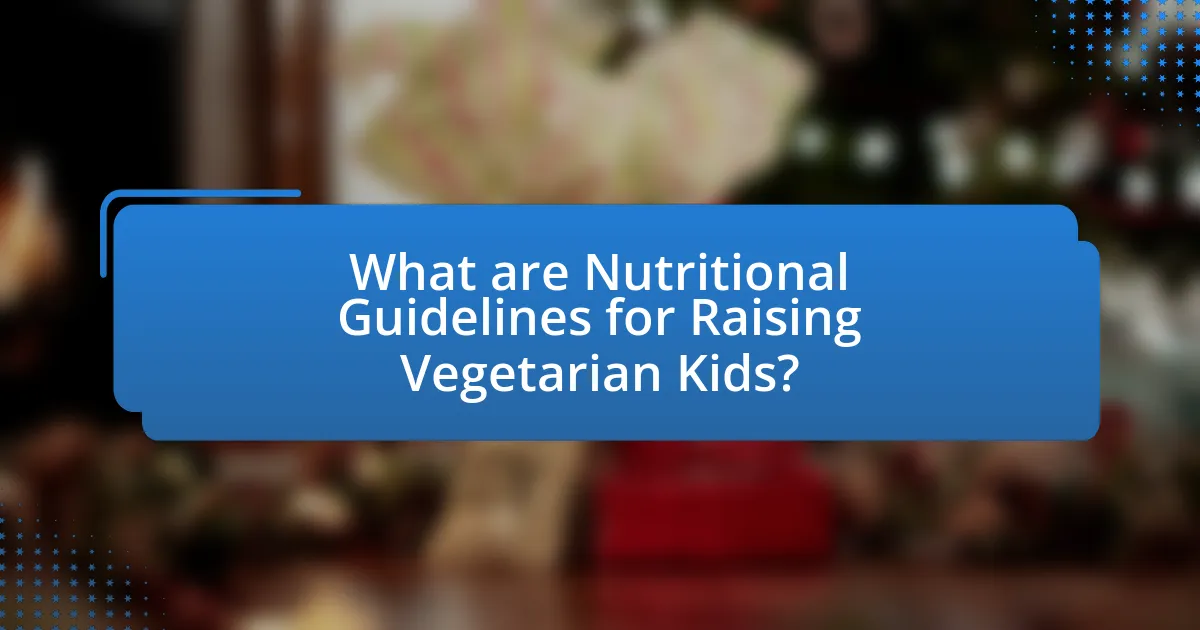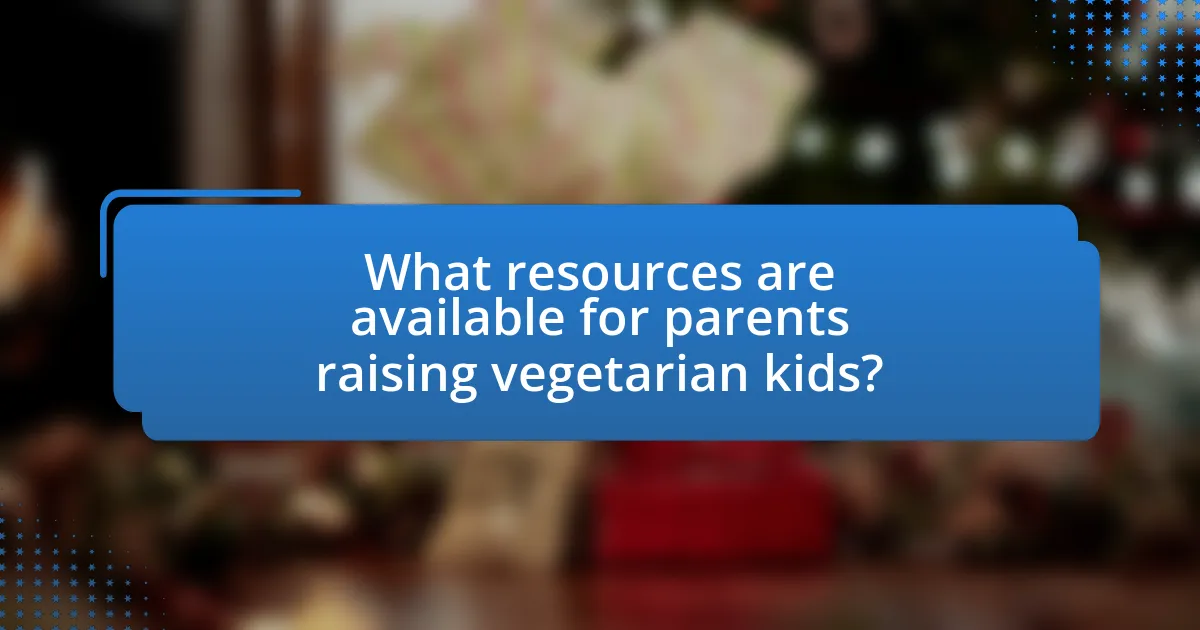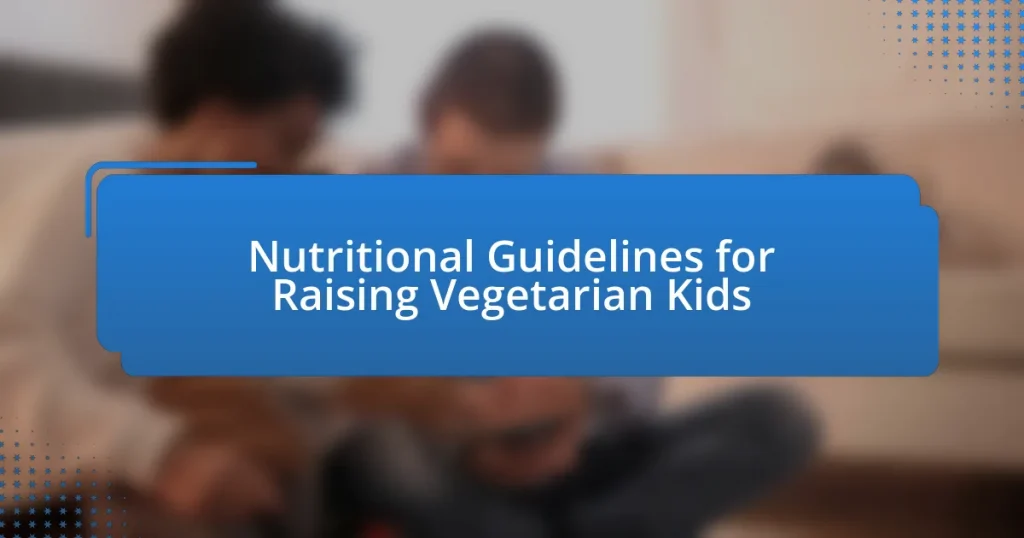Nutritional guidelines for raising vegetarian kids focus on ensuring a balanced diet rich in essential nutrients necessary for healthy growth and development. Key nutrients include protein, iron, calcium, vitamin B12, vitamin D, omega-3 fatty acids, and zinc, which can be sourced from various plant-based foods and fortified products. The article discusses the importance of following these guidelines to prevent nutritional deficiencies, the potential health benefits of vegetarian diets, and practical strategies for parents to create balanced meals. Additionally, it addresses common challenges and misconceptions associated with vegetarian diets for children, providing resources and tips for successful meal planning and preparation.

What are Nutritional Guidelines for Raising Vegetarian Kids?
Nutritional guidelines for raising vegetarian kids emphasize a balanced diet that includes a variety of plant-based foods to ensure adequate nutrient intake. Key components include sufficient protein from sources like legumes, nuts, and soy products; iron from fortified cereals, beans, and leafy greens; calcium from fortified plant milks and green vegetables; and vitamin B12 from fortified foods or supplements, as this vitamin is primarily found in animal products.
Research indicates that vegetarian diets can support healthy growth and development in children when properly planned. The American Dietetic Association states that well-planned vegetarian diets are nutritionally adequate and can provide health benefits in the prevention and treatment of certain diseases.
Why is it important to follow nutritional guidelines for vegetarian children?
Following nutritional guidelines for vegetarian children is crucial to ensure they receive adequate nutrients for healthy growth and development. Vegetarian diets can lack essential nutrients such as protein, iron, calcium, vitamin B12, and omega-3 fatty acids, which are vital for children’s physical and cognitive development. Research indicates that children on vegetarian diets are at risk of deficiencies if not properly managed; for instance, a study published in the Journal of the American Dietetic Association highlights that vegetarian children may have lower iron levels compared to their omnivorous peers. Adhering to nutritional guidelines helps parents plan balanced meals that include a variety of plant-based foods, fortified products, and supplements when necessary, thereby supporting overall health and preventing nutritional deficiencies.
What are the potential health benefits of a vegetarian diet for kids?
A vegetarian diet for kids can provide numerous health benefits, including improved nutrient intake, better weight management, and reduced risk of chronic diseases. Research indicates that vegetarian diets are often rich in fruits, vegetables, whole grains, and legumes, which contribute to higher fiber intake and lower saturated fat consumption. For instance, a study published in the Journal of the American Dietetic Association found that children following vegetarian diets had lower body mass indexes (BMIs) compared to their non-vegetarian peers, suggesting better weight management. Additionally, vegetarian diets have been associated with a lower risk of developing conditions such as heart disease and type 2 diabetes later in life, as evidenced by findings from the American Heart Association. These benefits highlight the potential of a well-planned vegetarian diet to support healthy growth and development in children.
What risks should parents be aware of when raising vegetarian kids?
Parents should be aware that raising vegetarian kids can lead to nutritional deficiencies, particularly in protein, iron, calcium, vitamin B12, and omega-3 fatty acids. These nutrients are often found in animal products, and their absence can result in health issues such as anemia, impaired growth, and developmental delays. For instance, a study published in the Journal of the American Dietetic Association indicates that vegetarian children may have lower iron stores compared to their omnivorous peers, which can affect their energy levels and cognitive function. Additionally, without proper planning, vegetarian diets may lack sufficient protein, which is essential for growth and muscle development. Therefore, parents must ensure that their vegetarian children receive a balanced diet that includes a variety of plant-based sources rich in these nutrients to mitigate these risks.
What essential nutrients do vegetarian kids need?
Vegetarian kids need essential nutrients such as protein, iron, calcium, vitamin B12, vitamin D, omega-3 fatty acids, and zinc. Protein can be obtained from legumes, nuts, and dairy products, while iron is found in lentils, beans, and fortified cereals. Calcium is crucial for bone health and can be sourced from dairy or fortified plant-based alternatives. Vitamin B12, primarily found in animal products, is vital for nerve function and can be supplemented or obtained from fortified foods. Vitamin D, important for calcium absorption, can be synthesized through sunlight exposure or taken as a supplement. Omega-3 fatty acids, which support brain health, can be derived from flaxseeds and walnuts. Zinc, necessary for growth and immune function, is present in whole grains, legumes, and nuts. These nutrients are critical for the overall growth and development of vegetarian children.
How can parents ensure adequate protein intake for vegetarian children?
Parents can ensure adequate protein intake for vegetarian children by incorporating a variety of plant-based protein sources into their diets. Foods such as legumes, nuts, seeds, whole grains, and dairy products (if not vegan) provide essential amino acids necessary for growth and development. For instance, lentils contain about 18 grams of protein per cooked cup, while quinoa offers approximately 8 grams per cooked cup, making them excellent choices for protein-rich meals. Additionally, combining different protein sources, like rice and beans, can create a complete protein profile, ensuring that children receive all essential amino acids.
What sources of iron are suitable for vegetarian kids?
Vegetarian kids can obtain iron from several plant-based sources, including lentils, chickpeas, beans, tofu, quinoa, fortified cereals, spinach, and pumpkin seeds. Lentils provide approximately 3.3 mg of iron per cooked half-cup, while chickpeas offer about 2.4 mg per cooked half-cup. Beans, such as kidney or black beans, contain around 2.1 mg per cooked half-cup. Tofu is another excellent source, with about 3 mg of iron per half-cup. Quinoa provides 2.8 mg per cooked cup, and fortified cereals can vary but often contain 4.5 mg or more per serving. Spinach, although containing non-heme iron, offers about 3.6 mg per cooked half-cup, and pumpkin seeds provide around 2.5 mg per ounce. These sources are essential for meeting the iron needs of vegetarian children, especially since plant-based iron is less readily absorbed than iron from animal sources.
How can parents provide sufficient calcium and vitamin D?
Parents can provide sufficient calcium and vitamin D by incorporating fortified plant-based milk, leafy greens, nuts, seeds, and vitamin D-rich foods into their children’s diets. Fortified plant-based milk, such as almond or soy milk, often contains added calcium and vitamin D, making it a suitable alternative to dairy. Leafy greens like kale and bok choy are excellent sources of calcium, while nuts and seeds, particularly almonds and chia seeds, also contribute to calcium intake. Additionally, parents can ensure adequate vitamin D levels by including foods like mushrooms exposed to sunlight and considering vitamin D supplements, especially in regions with limited sunlight exposure. Research indicates that children require 700 to 1,000 mg of calcium and 600 IU of vitamin D daily for optimal health, emphasizing the importance of these nutrients in vegetarian diets.
What role do omega-3 fatty acids play in a vegetarian diet?
Omega-3 fatty acids are essential for a vegetarian diet as they support brain development, cardiovascular health, and reduce inflammation. Vegetarians often lack direct sources of omega-3s, which are primarily found in fish, making it crucial to include plant-based sources such as flaxseeds, chia seeds, walnuts, and algae oil. Research indicates that these plant sources provide alpha-linolenic acid (ALA), a type of omega-3 that the body can convert to the more beneficial forms, EPA and DHA, albeit at a lower efficiency. A study published in the “American Journal of Clinical Nutrition” highlights that adequate intake of omega-3s is linked to improved cognitive function and overall health in children, emphasizing the importance of incorporating these fatty acids into a vegetarian diet for optimal growth and development.
How can parents create balanced vegetarian meals for their kids?
Parents can create balanced vegetarian meals for their kids by ensuring that each meal includes a variety of food groups, such as fruits, vegetables, whole grains, legumes, nuts, and seeds. This approach guarantees that children receive essential nutrients like protein, iron, calcium, and vitamins B12 and D. For instance, combining lentils with brown rice provides a complete protein source, while incorporating leafy greens and fortified plant-based milk can help meet calcium and vitamin D needs. Research indicates that a well-planned vegetarian diet can support healthy growth and development in children, as long as it is diverse and nutrient-dense.
What are some examples of balanced vegetarian meal plans?
Balanced vegetarian meal plans can include a variety of nutrient-dense foods to ensure adequate nutrition. For example, a day could consist of oatmeal topped with fruits and nuts for breakfast, a quinoa salad with mixed vegetables and chickpeas for lunch, and a dinner of lentil stew with brown rice and steamed broccoli. Snacks might include hummus with carrot sticks or a smoothie made with spinach, banana, and almond milk. These meal options provide essential proteins, vitamins, and minerals necessary for growth and development in vegetarian children.
How can parents incorporate a variety of foods into their children’s diets?
Parents can incorporate a variety of foods into their children’s diets by introducing diverse fruits, vegetables, grains, and protein sources regularly. This can be achieved by planning meals that include colorful produce, experimenting with different cuisines, and involving children in meal preparation to increase their interest in trying new foods. Research indicates that children are more likely to accept new foods when they are exposed to them multiple times; for instance, a study published in the journal “Appetite” found that repeated exposure can significantly increase acceptance of previously rejected foods. Additionally, parents can create a positive eating environment by making mealtime enjoyable and stress-free, which encourages children to explore various food options.

What challenges might parents face when raising vegetarian kids?
Parents may face several challenges when raising vegetarian kids, including ensuring adequate nutrition, managing social situations, and addressing potential peer pressure. Ensuring adequate nutrition is critical, as vegetarian diets can lack essential nutrients such as protein, iron, calcium, and vitamin B12, which are commonly found in animal products. According to the American Dietetic Association, a well-planned vegetarian diet can meet nutritional needs, but parents must be vigilant in providing a variety of foods to prevent deficiencies.
Managing social situations can also be challenging, as children may encounter difficulties during meals at school, birthday parties, or family gatherings where vegetarian options are limited. This can lead to feelings of exclusion or frustration for both the child and the parents. Additionally, peer pressure may arise, with children feeling compelled to conform to the eating habits of their friends, which can complicate adherence to a vegetarian lifestyle.
These challenges require parents to be proactive in meal planning, education about nutrition, and fostering a supportive environment that encourages healthy eating habits while navigating social dynamics.
How can parents address common misconceptions about vegetarian diets?
Parents can address common misconceptions about vegetarian diets by providing accurate information and resources that highlight the nutritional adequacy of such diets. For instance, they can educate themselves and their children about the essential nutrients found in plant-based foods, such as protein from legumes, iron from leafy greens, and calcium from fortified plant milks. Research indicates that well-planned vegetarian diets can meet the nutritional needs of children and adolescents, as supported by the American Dietetic Association, which states that vegetarian diets are healthful and nutritionally adequate. By sharing credible resources, engaging in discussions about the benefits of vegetarianism, and consulting with healthcare professionals, parents can effectively dispel myths and promote a positive understanding of vegetarian diets.
What are some common myths about protein in vegetarian diets?
Common myths about protein in vegetarian diets include the belief that vegetarians cannot get enough protein and that plant-based proteins are inferior to animal proteins. In reality, a well-planned vegetarian diet can provide adequate protein through sources such as legumes, nuts, seeds, and whole grains. Research indicates that plant proteins can be just as effective as animal proteins in supporting muscle health and overall nutrition when consumed in sufficient quantities. For instance, the Academy of Nutrition and Dietetics states that vegetarian diets are nutritionally adequate and can provide health benefits in the prevention and treatment of certain diseases.
How can parents combat peer pressure regarding food choices?
Parents can combat peer pressure regarding food choices by fostering open communication and encouraging confidence in their children’s dietary preferences. By discussing the reasons behind their vegetarian lifestyle, parents can help children articulate their choices to peers, making them feel more secure in social situations. Research indicates that children who understand the rationale behind their dietary choices are better equipped to resist peer pressure. For instance, a study published in the Journal of Nutrition Education and Behavior found that children who received education about nutrition and the benefits of plant-based diets were more likely to maintain their dietary preferences in social settings.
What strategies can help parents encourage healthy eating habits?
Parents can encourage healthy eating habits by involving children in meal planning and preparation. Research indicates that children who participate in cooking are more likely to try new foods and develop a preference for healthier options. For instance, a study published in the Journal of Nutrition Education and Behavior found that children who helped prepare meals consumed more fruits and vegetables compared to those who did not. Additionally, parents can model healthy eating behaviors by consuming a variety of nutritious foods themselves, as children often mimic their parents’ choices. Creating a positive mealtime environment, free from distractions, also supports healthy eating by allowing children to focus on their food and listen to their hunger cues.
How can parents involve kids in meal planning and preparation?
Parents can involve kids in meal planning and preparation by encouraging them to choose recipes and ingredients that align with their dietary preferences. This engagement fosters a sense of ownership and interest in food. For instance, parents can take children grocery shopping, allowing them to select fruits, vegetables, and vegetarian proteins, which enhances their understanding of nutrition. Research indicates that children who participate in meal preparation are more likely to try new foods and develop healthier eating habits. A study published in the Journal of Nutrition Education and Behavior found that children who help prepare meals are more inclined to consume fruits and vegetables.
What tips can help make vegetarian meals appealing to children?
To make vegetarian meals appealing to children, incorporate colorful ingredients and fun shapes. Research shows that children are more likely to eat foods that are visually appealing; for example, using a variety of vegetables in bright colors can attract their attention and stimulate interest in the meal. Additionally, presenting food in fun shapes, such as using cookie cutters for sandwiches or fruits, can enhance their engagement with the meal. Engaging children in the cooking process also increases their willingness to try new vegetarian dishes, as they feel a sense of ownership and excitement about the food they helped prepare.

What resources are available for parents raising vegetarian kids?
Parents raising vegetarian kids can access a variety of resources, including cookbooks, online forums, and nutritional guidelines from reputable organizations. Cookbooks such as “The Vegetarian Family Cookbook” by Tanya Petrovna provide recipes tailored for children, ensuring balanced nutrition. Online platforms like the Vegetarian Resource Group offer articles and resources specifically designed for parents, including meal planning tips and nutritional advice. Additionally, organizations like the American Dietetic Association provide guidelines that affirm well-planned vegetarian diets are appropriate for all stages of life, including childhood, ensuring that parents have credible information to support their children’s dietary needs.
What books or websites provide reliable information on vegetarian nutrition for kids?
Books that provide reliable information on vegetarian nutrition for kids include “Vegetarian Cooking for Kids” by Jennifer McCann and “The Vegetarian Child” by Sharon Palmer. Websites such as the Academy of Nutrition and Dietetics (eatright.org) and the Vegetarian Resource Group (vrg.org) offer evidence-based guidelines and resources specifically tailored for vegetarian children. These sources are recognized for their accuracy and comprehensiveness in addressing the nutritional needs of children following a vegetarian diet.
How can parents find support groups or communities for vegetarian families?
Parents can find support groups or communities for vegetarian families by utilizing online platforms, local community centers, and social media groups. Online resources such as websites dedicated to vegetarianism, like VegFamily and Vegetarian Resource Group, offer directories of local support groups. Additionally, parents can join social media platforms like Facebook, where groups specifically for vegetarian families exist, providing a space for sharing experiences and advice. Local community centers often host events or workshops focused on vegetarian lifestyles, which can also serve as networking opportunities. These methods are effective as they connect parents with like-minded individuals, fostering a supportive environment for raising vegetarian children.
What practical tips can parents implement for raising vegetarian kids?
Parents can implement several practical tips for raising vegetarian kids, including introducing a variety of plant-based foods, ensuring balanced nutrition, and involving children in meal preparation. Offering diverse options like fruits, vegetables, legumes, grains, nuts, and seeds helps children develop a taste for different foods. Balanced nutrition is crucial; parents should ensure that kids receive adequate protein, iron, calcium, and vitamins B12 and D from vegetarian sources. Involving children in cooking fosters interest in food choices and encourages them to try new dishes. Research indicates that children who participate in meal preparation are more likely to eat a wider variety of foods, promoting healthier eating habits.


